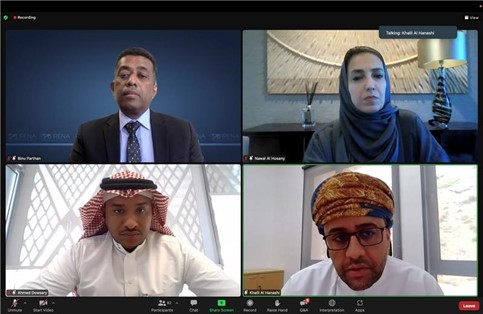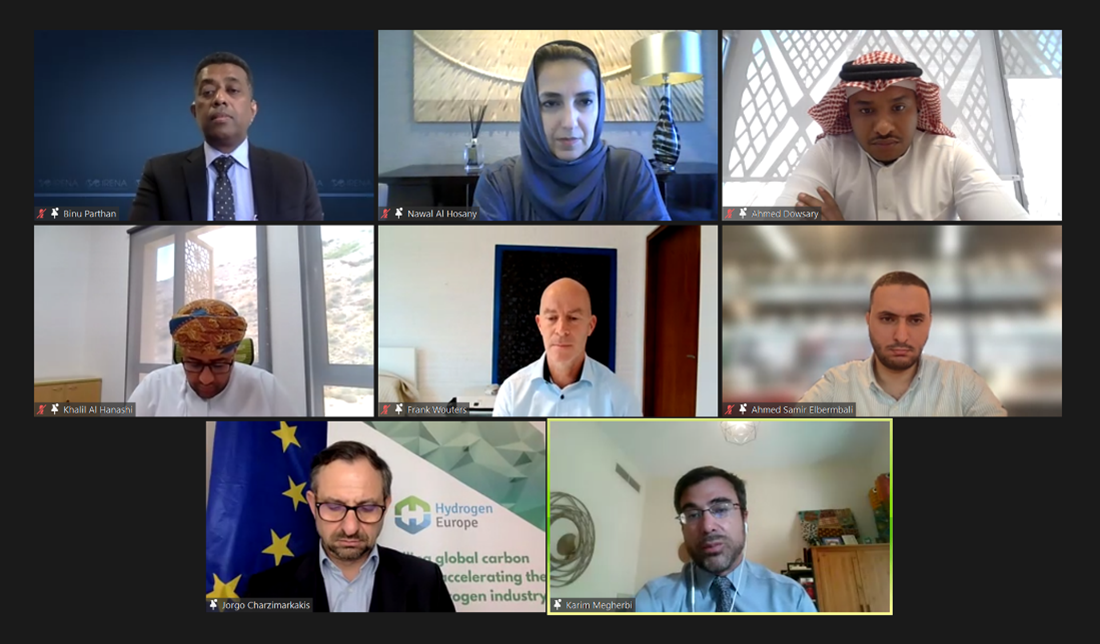Published on April 28, 2022
As countries grapple with the climate crisis and seek to navigate an evolving geopolitical landscape, the importance of both green hydrogen and PtX production and trade is becoming increasingly clear, alongside the necessity of close international cooperation to secure and promote this. Co-organised by the PtX Hub, EU, and IRENA, a virtual EU-Gulf Cooperation Council (GCC) workshop on green hydrogen was held on April 5, 2022. During lively exchanges between high-level public and private sector representatives, several prominent themes stood out.
5 Recurring Themes in the Dialogue:
- Time is of the essence. Opening the first panel discussion, Dr Binu Parthan (IRENA) declared “a great sense of urgency to act now” and the critical role that green hydrogen will play to decarbonise hard-to-abate sectors. This followed his reference to the previous day’s Intergovernmental Panel on Climate Change (IPCC) Working Group III report, which indicates a sobering ‘now or never’ scenario in which greenhouse gas (GHG) emissions must peak by 2025. Panellists from both the public and private sectors reiterated the corresponding need to speed up developments.
- EU demand for the import of green hydrogen has gained a newfound necessity. To achieve newfound targets, Dr Johannes Baur (European Commission) emphasised the need for partnerships with producer countries such as those within the GCC (view his presentation here). In the context of Russia’s invasion of Ukraine, the European Commission has proposed to phase out the import of Russian oil and gas, as well as to introduce a Hydrogen Accelerator (as outlined in its REPowerEU communication). Through this, it has further increased its ambitious hydrogen production target and aims to import an additional 10 million tonnes of green hydrogen per year by 2030.
- GCC countries are open to the export of green hydrogen to the EU. As confirmed by Dr Nawal Al-Hosany (UAE), Mr Ahmed Al-Dowsary (Saudi Arabia) and Dr Khalil Al Hanashi (Oman), there has already been significant dialogue between GCC countries and the EU. In light of the enormous renewable energy potential in the region, these countries are well-positioned to become exporters of green hydrogen in the future. Country representatives also pointed out that hydrogen will play a significant role in decarbonising the domestic energy system and diversifying the local economy.
- Challenges exist. Aside from limited time and the corresponding need to scale up investments, a key issue is the need for harmonisation and certification. Any certification scheme should not hinder market development or access. Rather, it must be accessible for all parties. Other challenges include lowering costs and building the necessary infrastructure for transportation.
- Solutions are on the horizon. Jorgo Chatzimarkakis (Hydrogen Europe) highlighted the German instrument H2Global and the upcoming European instrument the Global European Hydrogen Facility as derisking mechanisms. These will provide a certain degree of security for project implementors. In addition, the establishment of an international organisation for hydrogen importing and exporting countries was floated.

Outlook
Most notably, the workshop was positively marked by a clear desire for closer cooperation between the EU and GCC countries, as well as between public and private actors, on green hydrogen production and trade.
This was the second in a series of EU-MENA events to support the dialogue over the challenges and required policy measures to accelerate the production and trade of green hydrogen. Similar EU-G20 dialogues will be held in the coming months, including the First EU-Canada Dialogue on Hydrogen on 28 April 2022.
The workshop series is co-organised by the EU, International Renewable Agency (IRENA) and the PtX Hub. It is conducted under the EU-funded Strategic Partnership for the Implementation of the Paris Agreement (SPIPA) programme. SPIPA supports the EU’s efforts in climate policy and facilitates dialogue on climate policy options and good practices between the EU and non-European major economies. Frank Mischler leads the organisation of the workshop series at the PtX Hub.
Participants
Opening Remarks
Gauri Singh, Deputy Director-General, IRENA
Public Sector
Dr Johannes Baur, Deputy Head of Unit, DG ENER, European Commission – View presentation.
Dr Nawal Al-Hosany, Permanent Representative of the UAE to IRENA, Ministry of Climate Change and Environment, United Arab Emirates
Mr Ahmed Al-Dowsary, Business Development, Ministry of Energy, Saudi Arabia
Dr Khalil Al Hanashi, Energy Technology Lead, National Hydrogen Alliance (Hy-Fly), Petroleum Development, Oman
Private Sector
Frank Wouters, Director, EU-GCC Clean Energy Technology Network
Ahmed Samir Elbermbali, Director of Strategy and Operations, Clean Energy Business Council
Jorgo Chatzimarkakis, Secretary General, Hydrogen Europe
Karim Megherbi, Director, Dii Desert Energy
Moderators
Dr Zoheir Hamedi, MENA Programme Officer, IRENA
Johanna Friese, Junior Advisor, PtX Hub
Dr Binu Parthan, Head of Regions, IRENA
Reem Korban, Associate Programme Officer, IRENA
Contributing author: Johanna Friese
